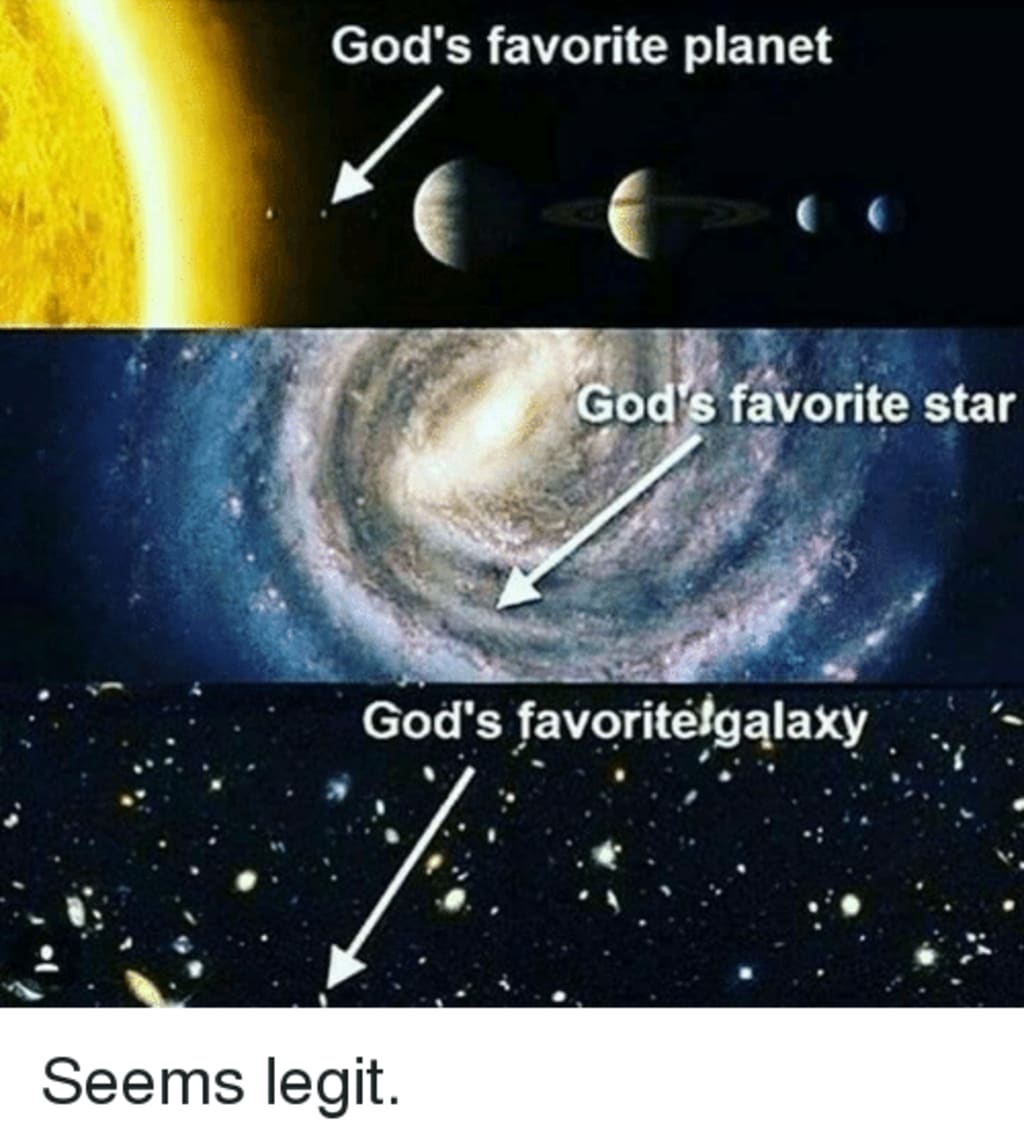Arguments for the Existence of God. Are They Still Relevant Today?
Do the ontological, teleological, and cosmological arguments have any bearing today?

Throughout the history of theology, there have been many arguments proposed to justify the existence of God. They have all not survived without some form of criticism, in many cases coming from believers themselves.
One of the most well-known arguments; and a good place to start this article, would be with the "ontological argument" for the existence of God. This is an A priori and deductive argument, meaning that it is an argument based on logical conditions, not scientific evidence; the notion that 2+2 = 4 is A priori and is always true.
Deductive simply means that if you accept the logical premise of this argument and you follow it to its conclusion, the conclusion must be correct.
The Ontological Argument
This argument was popularised by the Benedictine monk, "St Anselm of Canterbury" who was Archbishop of Canterbury. Anselm used this argument to prove the existence of God using only reason:
- God is a being that which no greater can be conceived.
- God exists in the mind at least.
- A being that exists in the mind is not as great as a being that also exists in reality.
- If God only exists in the mind he would not be the greatest possible being.
- Therefore God exists in reality as well as in the mind.
This line of reasoning allows us to think God into existence. The evolutionary biologist Richard Dawkins calls this argument childish by stating in his book The God Delusion that Anselm's argument is "language of the playground."
The argument was quickly opposed by another monk named "Gaunilo of Marmoutiers". While accepting its conclusion, Gaunilo rejected the arguments process, his rebuttal came in the form of his "perfect island" analogy.
In this, he replaced Anselm's "greatest possible being" with "perfect island", allowing him to prove the existence of an island of extreme beauty just by thinking it into existence. This showed that Anselm's line of reasoning was flawed because of its ability to "prove" the existence of almost anything, This is known as "reductio ad absurdum" or "appeal to the extreme."
However, Anselm came back to this, he said that this argument can only be applied to a:
"Necessary being"
A being, that by definition, "cannot not be." In other words, the existence of such a being is paramount to the existence of reality itself. This assertion of being a necessity was refuted by the German philosopher and ethicist "Immanuel Kant." Kant argued that
existence is not a predicate.
By this, he means that existence cannot be a predicate of something or a part of its definition. Existence cannot be added to something, because to first talk about the qualities of that thing it must exist in some form. This is known as the "begging the question" fallacy ("the conclusion of the argument is included in one of its premises"), this creates circular reasoning.
Another big issue with the ontological argument is its misuse of language. Anselm asserts that "God is a being that which no greater can be imagined." Alternatively, God is a conceptual being, something that exists in the mind is not that actual thing but a concept of it. This is well described in this "Rationality Rules" YouTube video on this topic, where he says:
"Painters don't paint trees, they paint paintings of trees."
In this manner, the God that exists in the mind is not actually a God but a concept of one.
Anselm's ontological argument was not the only one proposed. Alvin Plantinga, an American philosopher, proposed his own, calling it the "many worlds argument." It dodges some of the issues of Anselm's argument. In this he asserted the following:
- A thing has maximum greatness if it has maximal excellence in every possible world.
- Whatever has maximal excellence is omnipotent, omniscient, omnipresent, and omnibenevolent.
- There is a possible world where the possibility of maximal greatness is present.
- If it (maximal greatness) exists in that particular world, it is present in all possible worlds.
- If there is maximal greatness in every world, then it exists in this world.
This argument appears to avoid the objections surrounding existence as a predicate, as was Kant's issue with the original OA. It does this because "greatness does not predicate upon existence but upon the probability of existence."
Rene Descartes, a famous French philosopher and mathematician, formulated his own iteration of the ontological argument. The argument went like this:
- God is a supremely perfect being.
- Existence is part of that perfection.
- Therefore, God exists.
This argument comes into contact with the issue of "existence as a predicate" as well, as mentioned by Kant. It does this by asserting that existence is a part of perfection. David Hume, a Scottish theologian, also objected to this assertion stating that:
"You cannot define things into existence."
Descartes uses the example of a triangle to express his views on God. he says that:
"God without existence would be like a triangle without three sides."
The Cosmological Argument
This argument was popularised by "St Thomas of Aquinas", a Catholic priest. It is based on an understanding of causality. The argument goes like this:
- There are things that exist in the universe that are uncaused and in motion.
- Things that exist require other things to move, cause, or create them.
- The chain of causation cannot continuously regress forever.
- There must be an uncaused causer and an unmoved mover. This is God.
This argument possesses a glaring flaw, a schoolboy error. Such an issue can be spotted by a novice philosopher. This is the assertion that "everything that exists has a cause." However, it fails to assert what caused God to exist. This is recognized by Dawkins again in The God Delusion:
"All three of these arguments rely upon the idea of regress and invoke God to terminate it. They make the entirely unwarranted assumption that God himself is immune to the regress."
Some Islamic theologians in the ninth century formulated an alternative argument that can remove this "schoolboy error". "Al-Kindi" and "Al-Ghazali" were its main proponents before it was popularised in the modern era by Christian apologist "William Lane Craig". The argument fixes the error by changing "everything that exists" to "everything that begins to exist." The argument goes as follows:
- Whatever begins to exist has a cause.
- The universe began to exist.
- The universe has a cause, that cause is God.
Since God did not begin to exist (he has always existed) his existence can bypass the "schoolboy error". The evidence from Edwin Hubble of galaxies moving away from each other and the discovery of microwave background radiation suggested the universe had a beginning (The Big Bang). Does this mean the universe began to exist?
The Teleological Argument
The teleological argument is one from design. It makes the claim that because things in our natural world appear designed, then they must have been created by an all-powerful intelligence.
Thomas Aquinas argued from "design qua purpose" by stating that everything in the natural world appears to be heading towards a "Telos" or purpose. Aquinas followed this up with the concept of an arrow flying towards a target, The arrow is designed to fulfill its purpose of flying through the air to hit something.
One of the main proponents of this proposed concept of "intelligent design" was "William Paley", an English philosopher and Christian apologist. He came up with the watchmaker analogy, which is still used by some apologists today. Paley tells of somebody walking across a heath who stumbles upon a watch on the floor. He argues that such a thing could not have come about naturally because of its high level of complexity.
He assumes, quite rightly, that the watch must have had a watchmaker, but then jumps to the conclusion that this implies the universe must also have a cosmic watchmaker. This analogy has many well-documented flaws, some of which were noticed by David Hume.
Hume said that we are confusing things we make with that brought about by natural processes. Hume stated we have many examples of watches being made by watchmakers, but no examples of the world or the universe being made by a cosmic creator. Hume also claimed that if this proved the universe was created it could not prove a just, loving, and all-powerful (omnipotent) God exists like scripture suggests. Hume said it would be better to compare the universe or a piece of nature to a carrot and not a watch, as a carrot shows how structure can be achieved by natural processes in an organic manner.
Before 1859, when Darwin published On the Origin of Species, the concept of intelligent design appeared more tangible. However, as soon as the evidence for "evolution by means of natural selection" was realized, it was apparent that nature was capable of inducing great complexity in biology just by the use of simple natural rules.
Now, the nearly 200 years of evidence for evolution is so substantial that it is the only accepted scientific theory on the subject, this makes somebody who argues against it appear quite ridiculous. However, this didn't stop the American biochemist "Michael Behe" from giving it a try. He argued that some things in biology are "irreducibly complex", meaning that they could not be the result of gradual increments via evolution.
Behe gives the example of the "bacterial flagellum", a motor-like component of a bacteria that allows it to move. He argues that this mechanism could not have occurred via evolution because it consists of many components, that if one was removed it would no longer achieve its purpose.
This is true under the false assumption that it has been fulfilling the same purpose all along. Other bacteria have systems that look strikingly similar, which are used to inject toxins. This means we have a fully functioning piece of biology, but missing many of the parts that made the flagellum "irreducibly complex". Thus, the flagellum could have evolved from systems that originally arose to inject poison, things don't have to always follow the same purpose or final cause throughout evolution.
The human eye is another such irreducibly complex biological component. However, different stages of optical development can be seen throughout biology, past and present.
Beauty is often sighted as another example of God's intervention. The question simply is "How come there is beauty in nature if it was not designed?" This question usually stems from an anthropocentric point of view were by we see beauty as purposeless except for admiration. However, things that we perceive as "B-E-A-utiful" (to quote "Jim Carrey") might fit some other purpose that is evolutionarily beneficial, such as the bright colors of flowers to attract bees needed for fertilization or the facial symmetry of an attractive mate which signals genetic health.
So, let's add things up.
In conclusion, I believe it is safe to make the assertion that the ontological, teleological, and cosmological arguments pose many flaws which make them nonviable for proving the existence of God. These flaws in the ontological and cosmological arguments come in the form of logical fallacies that can degrade the entire arguments.
In relation to the teleological argument, the advance of the field of biology has pushed God into an even smaller gap, the concept of biology (at least) being "intelligently designed" has retreated, I think, into the realm of purepseudo-scientific nonsense.
So to return to the subtitle of this article, I think these arguments are completely outdated and should not be used today by apologists. Nevertheless, the Kalam cosmological argument and Alvin Plantinga's "modal argument" appear to stand up best to demolition via logical fallacies. But at most, all they can do is invoke the existence of an uncaring, unloving, deistic God.
About the Creator
Cosmic Peak
Cosmic peak is dedicated to creating useful and educational content on science, technology, the environment and philosophy and ethics. We leave no rock unturned in our noble quest for knowledge and understanding.






Comments
There are no comments for this story
Be the first to respond and start the conversation.